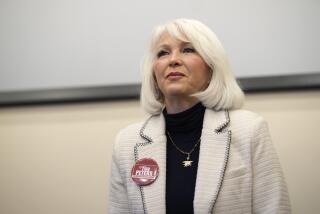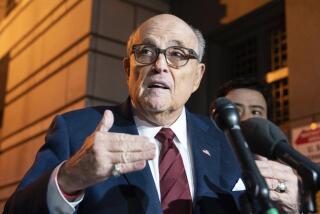Blagojevich convicted on 17 corruption counts
Reporting from Chicago — A federal jury today convicted former Gov. Rod Blagojevich on 17 of 20 counts, finding he brazenly abused the powers of his office in a series of attempted shakedowns captured on undercover government recordings.
Blogojevich showed no reaction as the jury announced their decisions, then sat back in his chair with his lips pursed and looked toward his wife Patti and whispered, “I love you.”
As the first guilty verdict was announced, Patti Blagojevich slumped into the arms of her brother, who stroked her head. Before the verdict was even read, she had started crying. She kept shaking her head “no” as the jurors left the courtroom.
This marks the second time in less than a year that the 54-year-old Blagojevich, the only Illinois chief executive ever impeached and ousted from office, had been convicted of a crime. The jury at his first trial last summer found him guilty of lying to theFBI, though that panel deadlocked on all the other counts. That impasse set the stage for a retrial.
This time the verdict was unequivocal, with the jury of 11 women and one man finding Blagojevich guilty on 17 criminal counts he faced, including charges of wire fraud, attempted extortion, bribery and conspiracy. The marquee charge in the case involved an attempt by Blagojevich in late 2008 to cash in on his power to name a replacement in theU.S. Senate for newly electedPresident Barack Obama.
The jury acquitted Blagojevich on one count and deadlocked on two others.
Blagojevich, the fourth former Illinois governor convicted of felonies since 1973, likely faces a significant prison sentence.
The sweeping verdict after last summer’s muddled end to the first trial represents a redemption of sorts for the office of U.S. Attorney Patrick Fitzgerald, who on the day of Blagojevich’s arrest in 2008 accused the then-governor of spearheading a “political corruption crime spree.”
Responding to complaints from jurors in the first trial that the government presentation was confusing, prosecutors streamlined the case by jettisoning complicated racketeering charges. Charges were also dropped against Blagojevich’s brother, Robert, his chief fundraiser who had been tried beside the former governor last summer.
In repackaging the case, prosecutors dispensed with evidence aimed at showing that Blagojevich had conspired with top fundraisers from the earliest days of his administration to corrupt state boards and pocket ill-gotten proceeds. Also erased was testimony about Blagojevich’s expensive taste in clothing and his tendency to shirk official responsibilities.
Testifying in his own defense, Blagojevich claimed prosecutors had twisted his words recorded on secret government wiretaps and insisted he was guilty of nothing more than thinking out loud. What’s more, Blagojevich’s lawyers emphasized, none of the illegal plots he was accused of hatching ever came to fruition.
Blagojevich’s turn on the witness stand, something he had promised to do in his first trial before backing out, proved a double-edged sword. Under cross-examination he came off as a quibbler as a prosecutor drew a bead on his credibility from the very first question: “You are a convicted liar, correct?”
Even before the verdict, Blagojevich’s defense team laid the groundwork for a likely appeal. They filed several motions for mistrial that accused U.S. District Judge James Zagel of pro-prosecution bias, but he denied them.
From the beginning, the case against Blagojevich was fraught with political overtones, though even before his arrest the former governor’s once-promising career had been in a steep decline amid scandal, tanking poll ratings and public feuds with leaders of his own Democratic party.
Given the nature of the charges, critics of Obama eyed the case closely for any hint that that the president or his close associates -- among them new Chicago Mayor Rahm Emanuel, Obama’s former chief of staff -- had abetted Blagojevich’s attempts at wheeling and dealing. But wiretaps and testimony showed an incoming White House both wary of Blagojevich and largely unresponsive to his attempts to land a cabinet post, ambassadorship or other lucrative post as the price for naming a senator to Obama’s liking.
In the end, jurors agreed with prosecutors that Blagojevich had tried to sell the Senate in a variety of ways, including an attempt to steer it to U.S. Rep. Jesse Jackson Jr. in exchange for $1.5 million in campaign cash promised by Jackson supporters.
Blagojevich was also convicted of several other shakedowns involving misuse of his official powers to raise campaign cash. The victims included a race track executive seeking swift action on a bill to benefit his industry and the CEO of Children’s Memorial Hospital seeking an increase in state-paid Medicaid reimbursement rates for pediatric specialists.
More to Read
Sign up for Essential California
The most important California stories and recommendations in your inbox every morning.
You may occasionally receive promotional content from the Los Angeles Times.










